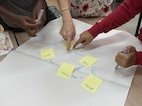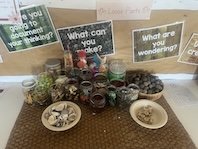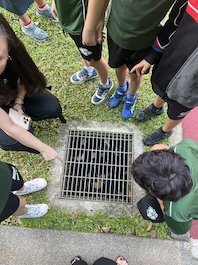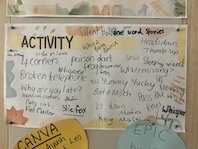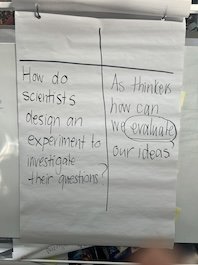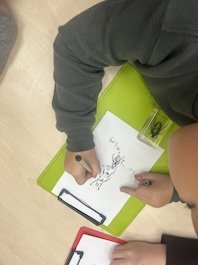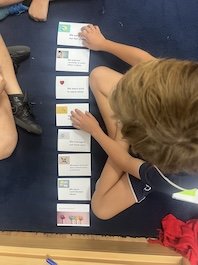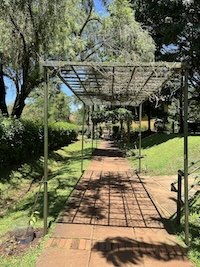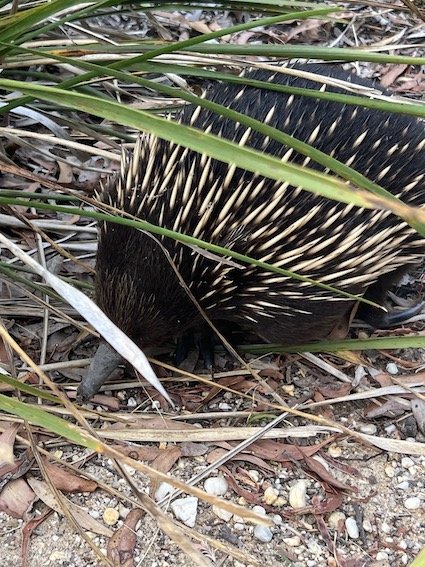“Teaching, like any science or art, demands craftsmanship. The complexity of teaching requires time and space for continuous learning and reflection, both individually and collectively.” (OECD, 2025:8)
I recently had the privilege of returning to the beautiful International School of Uganda to spend another week with the staff – supporting their work in building a culture of inquiry and, in particular, examining the role of pedagogy in nurturing deep, conceptual understanding and learner competencies. Once again, while we engaged in some teacher workshops and planning sessions, the bulk of our learning time was spent in classrooms. We designed/choreographed lessons and then met afterwards to discuss and reflect on what we noticed, what we learned and what got us more curious. On the third day, as I walked out of a classroom the wonderful PYP coordinator (shout out to Sarah!) turned to me and simply said: “I just love teaching!” Four simple words that went straight to my heart. ‘Same here!’ I said as we walked upstairs to the meeting room, our arms laden with baskets, markers, chart paper, books, loose parts, post its up the stairs, ‘Aren’t we lucky to do this?’ Not for the first time, I felt the enormous privilege of the career I have chosen and to which I have dedicated almost 42 years. For me, teaching has never simply been a job – it is a vocation and it is a choice to work in service of the community. I am not sure whether it is my imagination, or whether it is fact that I hear less about the joy and satisfaction of teaching than I used to. I certainly hear a great deal more about its difficulties and I absolutely acknowledge that conditions and expectations have changed significantly over the last 40 years. But, at the risk of attracting the ire of my readers, I think there are times when we can become so lost in what is challenging and so in need of a download about the difficulties of the job we have chosen, that we can forget the power of acknowledging the joy it can bring. We may feel it – but we forget to say it out loud. Yes – I am all too aware that I am not in the classroom full time … but I am in them enough to be reminded of the gift that teaching can be and I, for one, never want to forget that. So thank you, Sarah, for that moment when you chose to say it out loud!
The first few months of 2025 have seen me in many different countries and many different classrooms. Back home, now, I have taken some time to think over the hours and hours of ‘learning labs’ conducted in many different schools and to consider some of the reminders and insights these lessons have given me. Not just about the nature of inquiry pedagogy but simply about teaching itself. So, in no particular order, I offer some lessons from lessons …
1. It’s all about making connections!
Year 4, ISU
Yes, I know this already … but the more I teach, the more I understand about facilitating opportunities for learners to make connections – with each other, with their prior knowledge, across learning areas and between concepts. This is not new, of course. – connection making is the foundation for conceptual understanding, but it has been so fascinating to design tasks and power up our questioning to support this cognitive process in learners. Here, the grade 4 learners are using concept mapping to check in on their understanding of some of the concepts central to their inquiry. This strategy continues to be one of my favorites. It is so revealing to both the educator and to the learner.
2. Opportunities for exploring, theorising, experimenting and predicting prior to direct explanation can heighten curiosity and the desire to find out.
Year 2, ISU
In many (not all) lessons, we opted for an immediate rather than gradual release of responsibility. Exploration prior to explanation can pay off big-time. Giving learners a chance to do some ‘figuring out’, to draw on their prior knowledge and share their theories and ideas naturally activates curiosity, reveals uncertainty, generates a hunger to find out and, most of all, cultivates intellectual humility. The children in year 2 at ISU are not only theorising about which material might be the most waterproof but discussing how they would design a test to find out. All this before we find out more about the concept of fair testing. The beauty of this is in the way it supports a willingness to change our minds.
Year 4, Immanuel Primary School, SA
3. The language of materials is powerful
The benefits of loose parts to help learners explore and express their thinking is well known. Each time we open up opportunities for learners to share their ideas using intelligent, non-specific materials, I am reminded of the importance of flexible forms of communication. The ephemeral nature of loose parts gives increased permission to the learner to take risks, to revise thinking and the concrete and visual supports other ‘languages of expression’ including speaking and writing. It was so great to see loose parts available to children in the upper as well as junior classrooms at Immanuel Primary in SA.
4. The best ‘provocations’ are often on our doorstep, and first-hand, direct, shared experiences are gold.
Year 1, International School of Manila
I have written about this before but recent lessons have reminded me that we often do not need to look too far or spend hours carefully curating our classrooms to provoke thinking. Keeping it real and staying awake to the environment around us offers so much. At the International School of Manila, year 1 students were fascinated by the fact there were plants randomly growing in seemingly inhospitable environments in the school yard - the perfect provocation to lead into theorising about seed dispersal.
5. A brave, intellectually stimulating classroom environment is built on a foundation of trust and connection – and fun.
Class games played in year 4, UWCSEA
The year 4 students at United World College of Singapore were deeply engaged in a collaborative game when I walked into their classroom to teach. There was shared laughter, encouragement, risk and delight. Their teacher made a conscious, daily effort to build connection, have some fun and create community. I can feel this community atmosphere seconds into walking into a classroom. When kids have each other’s back – when there is a spirit of ‘we’ over ‘me’, the challenging work of inquiry is so much easier to cultivate.
6. Learner competencies such as collaboration, creativity and curiosity are amplified when we are intentional about how we are cultivating them.
Split screen learning intentions for year 4 students at BCIS
The metaphor of the ‘split screen’ classroom is one I learned from my colleague Guy Claxton. It is SO helpful when I am introducing a session. It reminds both the learners and me that we are always inquiring into learning itself as we engage with the content of the lesson. Each lesson I have the privilege of facilitating reminds me how important both my language and the clarity of intention are in maintaining a strong focus on the WHY behind the learning engagement.
7. Active learning doesn’t mean fast and frantic. Slow and deliberate helps us go deep.
Year 1 students at the International School of Belgrade
The temptation to teach at a fast past is real - and understandable! We want to keep children’s attention and manage the many competing demands of the day. But engagement can be achieved as, if not more, effectively by slowing the pace – by allowing pauses, by welcoming silence, by encouraging revisiting and refining rather than moving on, by allowing children time to think and by modelling a slower, more considered way of being. We were fascinated to watch how focussed and thoughtful the year 1 children at the International School of Belgrade were when encouraged to slow down and notice the detail as they observed fascinating invertebrates.
8. Building children’s capacity to reflect on and manage their own learning can be part of every lesson.
Year 4 learners at Jakarta Intercultural School
I wish I had understood this more in my early years of teaching. I am sure that many of the children I taught were motivated by the desire to please ME rather than to own the learning themselves. The longer I teach, the more I realise how simple it can be to empower learners to take more ownership of their learning. It may be through a couple of strategic questions or, something more extended such as the way the year 4 children at the Intercultural School of Jakarta ranked their collaborative competencies during the creation of a Rube Golberg Machine.
9. Every lesson, every day can be an opportunity for professional learning.
Kindergarten at IS Manila
The teacher as researcher is a concept very familiar to early years teachers in particular. For me, years of teaching in a ‘learning lab’ environment (with other teachers observing or perhaps being filmed) has helped me embrace this concept so much more authentically. The power of having more than one educator in the room, of intentionally observing the dance between teaching and learning is brought home every time I gather with those educators to reflect on the lesson. We notice more. We wonder more. We learn more. I know I am a better teacher for it – for having cultivated a kind of intentionality and ability to observe what is happening while it is happening. Learning labs help me sustain my ‘beginners mind’ - seeing the art of teaching as if for the first time and staying open to the unexpected. Watching each other at work can be hard to organise in a busy school – but it is so profoundly worth it.
10. Good teaching is complex, challenging and deeply satisfying. Quality teaching can’t be scripted although it can, of course, draw on resources and guidelines. While I have a deep commitment to inquiry-based pedagogy, regular teaching continually reminds me of the role that explicit and even direct instruction have within a broader culture of inquiry. There is no ‘BEST’ practice as such – what works depends on what the objectives are (what works for what purpose?) and, of course, on the myriad differences between learners, contexts, environments and cultures. As the recent OECD report I have referenced states “There is not one single approach that is ‘better’ than the others.” (2025:15) One thing I notice repeatedly about learning labs is that they help educators return to, what for most is their north star. Teaching. Many schools would do well to elevate the sacredness of the time we spend working directly with our learners, to value and celebrate and inquire into the fascinating and complex choreography and skill that underpins each lesson across the day and to see the classroom as the best context for professional growth.
“Teaching is inherently complex. Teachers need to navigate the complexity of the often unpredictable and sometimes chaotic realities of classrooms, where students have diverse needs and abilities, resources are limited, time is constrained, and numerous day-to-day challenges arise. They need a deep understanding of both content and pedagogical strategies informed by research, but also adaptability, creativity, and responsiveness. Teaching is a science, but so too an art and craft.”
OECD (2025), Unlocking High-Quality Teaching, OECD Publishing, Paris, https://doi.org/10.1787/f5b82176-en.

